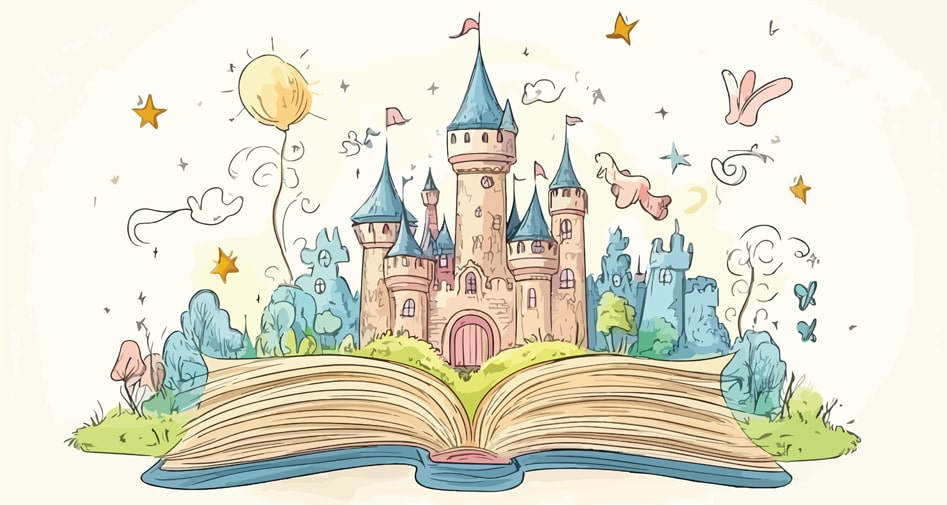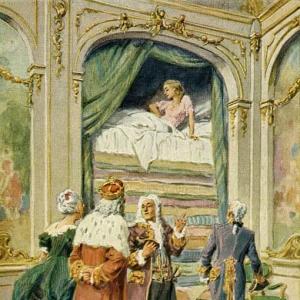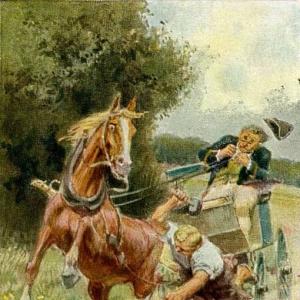Reading time: 7 min
There were once two brothers, the one rich, the other poor. The rich one, however, gave nothing to the poor one, and he gained a scanty living by trading in corn, and often did so badly that he had no bread for his wife and children. Once when he was wheeling a barrow through the forest he saw, on one side of him, a great, bare, naked-looking mountain, and as he had never seen it before, he stood still and stared at it with amazement. While he was thus standing he saw a twelve great, wild men coming towards him, and as he believed they were robbers he pushed his barrow into the thicket, climbed up a tree, and waited to see what would happen. The twelve men, however, went to the mountain and cried, „Semsi mountain, Semsi mountain, open,“ and immediately the barren mountain opened down the middle, and the twelve went into it, and as soon as they were within, it shut. After a short time, however, it opened again, and the men came forth carrying heavy sacks on their shoulders, and when they were all once more in the daylight they said, „Semsi mountain, Semsi mountain, shut thyself;“ then the mountain closed together, and there was no longer any entrance to be seen to it, and the twelve went away.
When they were quite out of sight the poor man got down from the tree, and was curious to know what really was secretly hidden in the mountain. So he went up to it and said, „Semsi mountain, Semsi mountain, open,“ and the mountain opened to him also. The he went inside, and the whole mountain was a cavern full of silver and gold, and behind lay great piles of pearls and sparkling jewels, heaped up like corn. The poor man hardly knew what to do, and whether he might take any of these treasures for himself or not; but at last he filled his pockets with gold, but he left the pearls and precious stones where they were. When he came out again he also said, „Semsi mountain, Semsi mountain, shut thyself;“ and the mountain closed itself, and he went home with his barrow.
And now he had no more cause for anxiety, but could buy bread for his wife and children with his gold, and wine into the bargain. He lived joyously and uprightly, gave help to the poor, and did good to every one. When, however, the money came to an end he went to his brother, borrowed a measure that held a bushel, and brought himself some more, but did not touch any of the most valuable things. When for the third time he wanted to fetch something, he again borrowed the measure of his brother. The rich man had, however, long been envious of his brother’s possessions, and of the handsome way of living which he had set on foot, and could not understand from whence the riches came, and what his brother wanted with the measure. Then he thought of a cunning trick, and covered the bottom of the measure with pitch, and when he got the measure back a piece of money was sticking in it. He at once went to his brother and asked him, „What hast thou been measuring in the bushel measure?“ – „Corn and barley,“ said the other. Then he showed him the piece of money, and threatened that if he did not tell the truth he would accuse him before a court of justice. The poor man then told him everything, just as it happened. The rich man, however, ordered his carriage to be made ready, and drove away, resolved to use the opportunity better than his brother had done, and to bring back with him quite different treasures.
When he came to the mountain he cried, „Semsi mountain, Semsi mountain, open.“ The mountain opened, and he went inside it. There lay the treasures all before him, and for a long time he did not know which to clutch at first. At length he loaded himself with as many precious stones as he could carry. He wished to carry his burden outside, but, as his heart and soul were entirely full of the treasures, he had forgotten the name of the mountain, and cried, „Simeli mountain, Simeli mountain, open.“ That, however, was not the right name, and the mountain never stirred, but remained shut. Then he was alarmed, but the longer he thought about it the more his thoughts confused themselves, and his treasures were no more of any use to him. In the evening the mountain opened, and the twelve robbers came in, and when they saw him they laughed, and cried out, „Bird, have we caught thee at last! Didst thou think we had never noticed that thou hadst been in here twice? We could not catch thee then. This third time thou shalt not get out again!“ Then he cried, „It was not I, it was my brother,“ but let him beg for his life and say what he would, they cut his head off.
 Learn languages. Double-tap on a word.Learn languages in context with Childstories.org and Deepl.com.
Learn languages. Double-tap on a word.Learn languages in context with Childstories.org and Deepl.com.Backgrounds
Interpretations
Adaptions
Summary
Linguistics
„Simeli Mountain“ is a German fairy tale collected by the Brothers Grimm, Jacob and Wilhelm, who were famous for their collection of folktales and legends. The story was published in the first edition of their collection, titled „Kinder- und Hausmärchen“ (Children’s and Household Tales), which was released in 1812. The Brothers Grimm were not only known for their work as collectors and editors of folktales but also for their significant contributions to linguistics, philology, and German cultural history.
The Grimm brothers were born in the late 18th century in Hanau, Germany. They were both scholars who shared a deep interest in the preservation of folklore and the study of the German language. Their primary goal was to collect and document the oral traditions of their culture, which they believed were disappearing due to the process of industrialization and urbanization.
The tales compiled by the Brothers Grimm have become an essential part of Western literary and cultural history, influencing countless authors, artists, and filmmakers. Their collection of fairy tales includes widely known stories such as „Cinderella,“ „Hansel and Gretel,“ „Rapunzel,“ and „Snow White.“ These stories often feature moral lessons and cautionary themes, which have resonated with audiences across generations.
„Simeli Mountain“ is one of the lesser-known stories in the Grimm brothers‘ collection but shares common themes with their other tales, such as the importance of generosity, the dangers of greed and envy, and the idea of justice and retribution.
„Simeli Mountain“ is a fairy tale that contains several themes and moral lessons that can be interpreted in various ways:
The consequences of greed and envy: The rich brother’s envy of his sibling’s newfound wealth leads him down a path of deceit and ultimately to his tragic end. His greed prevents him from remembering the name of the mountain, which results in his capture and death. This tale serves as a warning against allowing greed and envy to consume one’s life.
The power of generosity and compassion: The poor brother, despite his initial struggles, chooses to be generous and compassionate with his newfound wealth. He helps the less fortunate and does good deeds, ultimately leading a fulfilling and happy life. This theme emphasizes the importance of kindness and selflessness, which can lead to a more meaningful existence.
The danger of secrets and dishonesty: The poor brother’s secret about the mountain leads to his sibling’s discovery and eventual demise. This theme highlights the potential harm that can come from keeping secrets and being dishonest with others, even when intentions might be good.
The significance of humility and contentment: The poor brother is content with the gold he takes from the mountain, leaving the more valuable treasures behind. This demonstrates the importance of being humble and appreciating what one has, rather than always striving for more.
The idea of justice and retribution: The rich brother’s actions ultimately lead to his punishment at the hands of the robbers. This theme suggests that those who act unjustly and selfishly may eventually face the consequences of their actions.
Overall, „Simeli Mountain“ offers a moral lesson on the importance of generosity, compassion, humility, and contentment, while cautioning against the dangers of greed, envy, dishonesty, and a lack of appreciation for what one has.
While „Simeli Mountain“ is not one of the more popular fairy tales from Brothers Grimm, there have been a few adaptations and retellings of the story over the years. Here are some examples.
„The Mountain Princess“ by Loretta Ellen Brady – This is a children’s book adaptation of the story with colorful illustrations.
„Simeliberg“ by William J. Brooke – This is a retelling of the story in verse form, first published in 1926.
„The Talking Fox“ by Niki Daly – This is a South African adaptation of the story, in which a young boy named Sibusiso goes on a quest to find the Talking Fox and save his village from drought.
„Simeliberg: A Fantasy Novella“ by E. C. Hibbs – This is a modern retelling of the story with a darker, more complex plot.
„The Simeli Mountain“ by Blanca Álvarez – This is a Spanish-language retelling of the story with colorful illustrations.
These adaptations vary in terms of tone, style, and target audience, but all draw on the basic elements of the original tale, such as the quest for a mysterious mountain, the talking fox, and the theme of personal growth and self-discovery.
„Simeli Mountain“ is a fairy tale by the Brothers Grimm about two brothers – one rich and the other poor. The rich brother is ungenerous, while the poor brother struggles to provide for his family. One day, the poor brother stumbles upon a mysterious mountain, where he witnesses twelve wild men entering the mountain using the phrase „Semsi mountain, Semsi mountain, open.“ Intrigued, he tries the same phrase, and the mountain opens, revealing a cavern filled with silver, gold, pearls, and precious stones.
The poor brother takes some gold, leaving the other treasures untouched, and returns home to support his family. He lives joyously and generously, helping the poor and doing good deeds. When his money runs out, he returns to the mountain twice more, each time borrowing a measure from his rich brother.
However, the rich brother becomes envious of the poor brother’s newfound wealth and suspects something unusual. He devises a trick by covering the bottom of the measure with pitch, and when the poor brother returns it, a piece of money sticks to it. Confronted and threatened with legal action, the poor brother confesses everything.
Driven by greed, the rich brother visits the mountain, intending to take more valuable treasures than his sibling. He gathers as many precious stones as he can carry, but in his excitement, he forgets the name of the mountain, mistakenly calling it „Simeli mountain“ instead of „Semsi mountain.“ The mountain remains closed, trapping the rich brother inside.
In the evening, the mountain opens for the twelve wild men, who are revealed to be robbers. They recognize the rich brother from his previous visits and, despite his pleas for mercy, they execute him for his greed and deceit.
The fairy tale „Simeli Mountain,“ also known as „Simeli Berg,“ is a classic Brothers Grimm story that unfolds around themes of greed, secrecy, and retribution, featuring two brothers with contrasting moral characters. A linguistic analysis of this tale can reveal the underlying narrative techniques and thematic elements.
Narrative Structure and Style: The story uses a straightforward, linear narrative typical of fairy tales, beginning with „There were once two brothers,“ which immediately situates the reader in the realm of traditional storytelling. The language is simple and direct, suited for oral storytelling, with a focus on action and dialogue over description.
Characterization through Contrast: The brothers are defined by their wealth status and moral disposition—one is rich and greedy, while the other is poor but becomes generous with newfound wealth. This contrast is typical of fairy tales, where characters often embody clear moral opposites.
Repetition and Formulaic Language: The magic words „Semsi mountain, Semsi mountain, open“ and „Semsi mountain, Semsi mountain, shut thyself“ are repeated several times, creating a rhythmic incantation that is key to the plot. Repetition serves both as a mnemonic device for storytelling and emphasizes the magical realism within the tale.
Themes and Motifs
Greed and Punishment: The tale shows the consequences of greed, with the rich brother’s insatiable desire for wealth leading to his downfall. His forgetfulness of the magic words symbolizes the moral confusion that arises from greed.
The Secret and the Forbidden: The mountain represents hidden knowledge and wealth, accessible only through specific knowledge (the magic words), which aligns with motifs of secret passages in folklore.
Justice and Retribution: The story delivers a moral lesson where the good-hearted poor brother thrives, while the greedy rich brother faces a grim fate—an exemplar of poetic justice.
Symbolism
The Mountain: Represents an unyielding, mysterious force of nature that guards its treasures. It acts both as a reward for the just and a trap for the greedy.
The Twelve Robbers: Symbolize the guardians of the mountain’s wealth, serving as enforcers of moral justice who punish the rich brother’s transgressions.
Moral and Didactic Elements: The tale, like many in the Brothers Grimm collection, carries a moral message. It warns against the perils of greed and teaches that wealth, when not paired with virtue, leads to ruin.
This linguistic and thematic analysis reveals how „Simeli Mountain“ uses common fairy tale elements—such as repetition, moral dichotomies, and magical realism—to teach moral lessons, drawing its power from oral storytelling traditions and the universal themes of human greed and justice.
Information for scientific analysis
Fairy tale statistics | Value |
|---|---|
| Number | KHM 142 |
| Aarne-Thompson-Uther-Index | ATU Typ 676 |
| Translations | DE, EN, DA, ES, PT, IT, JA, NL, PL, RU, TR, VI |
| Readability Index by Björnsson | 39.6 |
| Flesch-Reading-Ease Index | 71.5 |
| Flesch–Kincaid Grade-Level | 9.5 |
| Gunning Fog Index | 11.6 |
| Coleman–Liau Index | 8.8 |
| SMOG Index | 9.1 |
| Automated Readability Index | 10.8 |
| Character Count | 4.591 |
| Letter Count | 3.562 |
| Sentence Count | 34 |
| Word Count | 853 |
| Average Words per Sentence | 25,09 |
| Words with more than 6 letters | 124 |
| Percentage of long words | 14.5% |
| Number of Syllables | 1.108 |
| Average Syllables per Word | 1,30 |
| Words with three Syllables | 35 |
| Percentage Words with three Syllables | 4.1% |

 Facebook
Facebook  Whatsapp
Whatsapp  Messenger
Messenger  Telegram
Telegram Reddit
Reddit














